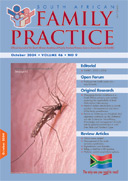Managing chronic conditions in a South African primary care context: exploring the applicability of Brief Motivational Interviewing.
Abstract
Background: Brief Motivational Interviewing (BMI) is an approach to motivating behaviour change in general health care settings. The relevance and applicability of BMI has not been fully assessed in low- or middle-income country settings. This study explored the application of BMI by general practitioners (GPs) in a public sector primary care setting in Cape Town, South Africa. Methods: How BMI should be adapted and applied was explored by means of a cooperative inquiry group of GPs. This participatory action research involved four action-reflection cycles over a five-month period during which GPs were trained to use BMI skills in their practice and to document and reflect on their experience. Results: GPs found the emphasis on self-evaluation, personal choice and control particularly useful. Skills in open questioning, exchanging information carefully, assessing ambivalence and readiness to change were also helpful. They had mixed experiences with skills for agenda setting and reducing resistance. The use of specific scaling questions and decision balance sheets were not useful. Conclusions: BMI has great potential, as the skills learnt were mostly useful and the process had benefits for the participants. If the full potential of BMI is to be realised, the content will need to be adapted to local clinical conditions. BMI needs to be taught using a participatory educational style and its implementation must be accompanied by support from colleagues and management. Future research on this issue should evaluate the process of implementing BMI skills in different primary care settings and sustaining any positive changes that may occur. (SA Fam Pract 2004;46(9): 21-26)
Published
2004-10-01
Section
Original Research
By submitting manuscripts to SAFP, authors of original articles are assigning copyright to the South African Academy of Family Physicians. Copyright of review articles are assigned to the Publisher, Medpharm Publications (Pty) Ltd, unless otherwise specified. Authors may use their own work after publication without written permission, provided they acknowledge the original source. Individuals and academic institutions may freely copy and distribute articles published in SAFP for educational and research purposes without obtaining permission.

